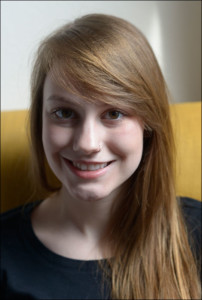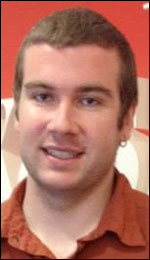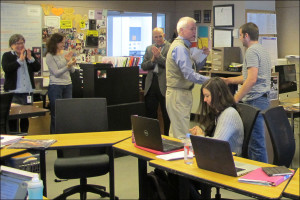Jessica Anania and Sky Chadde Win Dean’s Award for Personality Profile in Mastering the Method Contest
Winning Stories Selected from 52 Entries
Columbia, Mo. (March 21, 2014) — Jessica Anania and Sky Chadde are the winners of the Dean’s Award for the personality profile category in the Mastering the Method contest at the Missouri School of Journalism.
The contest recognizes outstanding work by undergraduates in the areas of broadcast, multimedia, photography and writing. The top two winners in each of the 14 categories receive a $100 gift card.
Anania and Chadde’s stories were chosen from among 52 entries.

Jessica Anania
Anania’s story, “World’s Worst Farmer Turns Mishaps of Working the Land into Comedy,” ran on Oct. 21, 2013, in the Columbia Missourian. The faculty editor was Jeanne Abbott.
“A series of strokes threatened Lewis Baumgartner’s ability to make people laugh. But with patience and persistence, he turned adversity into an advantage,” the judges said of her story. “Jessica Anania tells this man’s story with detail and dignity, along with a healthy sampling of Baumgartner’s self-deprecating humor.”
Anania shares the story behind her article:
I was driving out to take video for another story I was working on, when I passed a large barn with ‘world’s worst farmer’ written on it. The slogan intrigued me, so I doubled back after finishing my video. There, I eventually met Lewis Baumgartner – the self-proclaimed world’s worst farmer – and his wife, Janice Baumgartner.

Sky Chadde
Chadde’s story, “True/False Film Fest’s David Wilson Captures Small-Town Life in First Feature Film,” was published Nov. 14, 2013, in Vox Magazine. The faculty editor was John Fennell. Chadde, a magazine journalism student from Socorro, N.M., is currently the VoxTalk Editor. After graduation in May, Chadde will move to Dallas to begin a fellowship with the Dallas Observer.
“Worries about how subjects in a revealing documentary would react kept True/False co-founder David Wilson awake at night – till he finally shared his project with them. Skye Chadde captured the angst and relief Wilson experienced in the making of an honest examination of four entertainers struggling to succeed in Branson in a documentary titled “We Always Lie to Strangers,” contest judges said of Chadde’s piece.
Chadde shares the story behind his article:
This story was actually assigned to me. I was a contributing writer at Vox, and I jumped at the opportunity to write my first long magazine feature. Up to that point, I had mostly written for newspapers, including the Columbia Missourian.
The reporting was fairly easy and straightforward. Director David Wilson had agreed to sit down with me, and the rest of the sources in the story came from him. He gave me the numbers of the people in Branson, his co-director and producers, and his mother. The hardest part was trying to find times that worked for the filmmakers to talk. Everyone was really open and willing to speak about her or his experiences with the documentary.
But I had a lot of time to work with, which would prove to be a godsend, especially when I sat down to write it. The story was slated to run Nov. 14 to coincide with the documentary’s showing at the St. Louis International Film Festival, its first Missouri showing, and I believe I took it on the last week of September. Due to his traveling schedule, Wilson couldn’t sit down for an interview until the first week of October.
The first sit-down was 20 minutes long. I think he fit me in between meetings. We sat down a week later for about 40 minutes. He had got back from Portland, I believe, the night before, and he had yet another meeting to run off to (or something). So, ultimately, I only had about an hour to gather all the information I could. I called him a few times to flesh some scenes out, but otherwise that was it.

During our second sit-down, Wilson said something that, to me, made the story. He said that, before he made this documentary, he didn’t feel like much of a filmmaker, which, if you asked around town, that would be the number one response you’d get about him. Making the documentary was his way of proving to himself he was a filmmaker.
Boom. Internal conflict.
Internal conflict, a key component of fiction, adds so much to a story. It adds tension, which makes people want to read on, to see how the story is resolved. And I had stumbled onto it!
To talk briefly about the writing process: I’d never written a narrative before. I struggled to discover what the beginning, middle and end should be. I turned in my first draft and John Fennell, the writing coach at Vox that semester, told me it was too much like a newspaper article. No scenes and no sense of character.
I just want to give a huge shout-out to Professor Fennell. He read through the seven or eight drafts I gave him, reading each one and offering constructive critiques. He told me to slow down and describe the settings. Then, once I did that, he told me to focus on the beginning of each section, making them as good as I possibly could, to really make people read on. He also suggested opening the story with the scene in which Wilson shows his subjects the doc for the first time.
Anyway, it was a lot of fun. Thanks for reading.
Updated: July 23, 2020